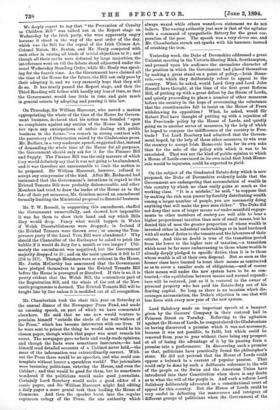On the subject of the Graduated Estate-duty which is now.
proposed, the Duke of Devonshire evidently holds that the Government are endangering that accumulation of wealth in this country by which no class really gains so much as the working class. "it is a mistake," he said, "to suppose that. by making the rich man poorer by forcibly distributing wealth among a larger number of people, you are necessarily doing anything that will make the poor man richer." The Duke did not deny that men of larger means not under manifold engage- ments to other members of society are well able to bear a higher proportional taxation than men of small means, but he denied this of men the greater proportion of whose wealth is- invested either in industrial undertakings or in land burdened with all sorts of duties to the tenants and the labourers of their estates. And this no doubt is true of the transition period from the lower to the higher rate of taxation,—a transition, which must be far more embarrassing to those whose wealth is already deeply pledged to specific duties, than it is to those whose wealth is all at their own disposal. But so soon as the- former class have learned to treat their means as contracted so as to cover a smaller scale of obligations,—and of course their means will under the new system have to be so con- tracted,—the equilibrium between means and normal expendi- ture will be restored, just as it is restored to the owner of personal property who has paid his Estate-duty out of his. floating capital. So long as there is no taxation which dis- courages accumulation, the Duke's objection is one that will lose force with every new year of the new system.






































 Previous page
Previous page